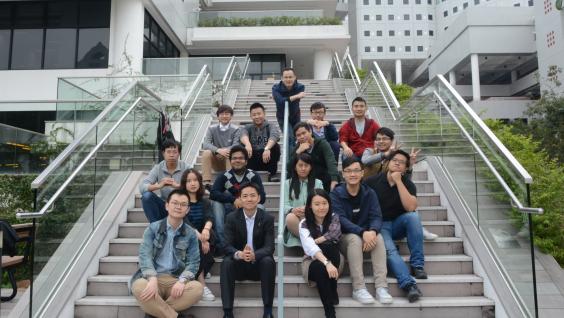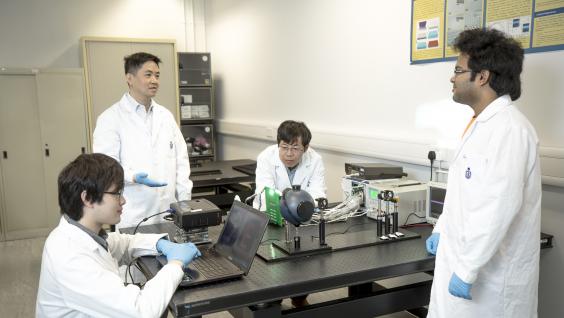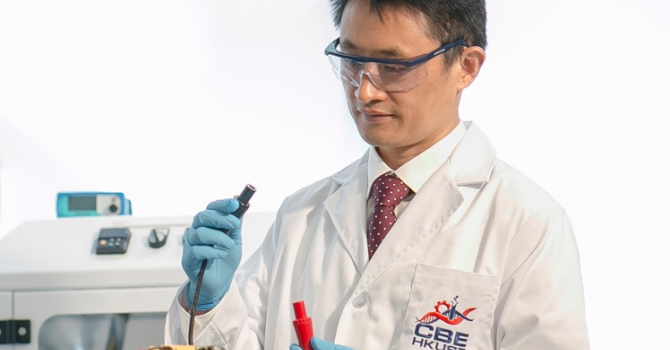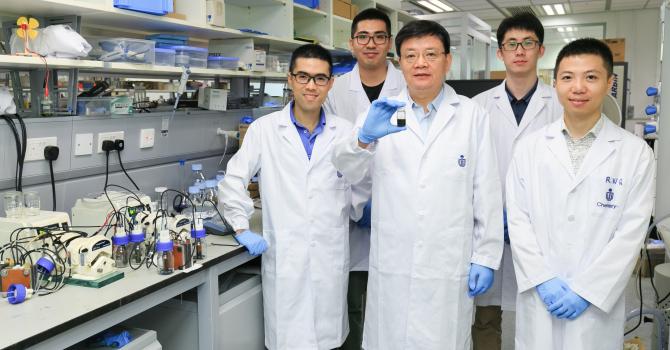Prof. FAN Zhiyong Leads His Team to Publish Sci Fi-Inspired ‘Super Human Eye’ Research in Nature
Prof. FAN Zhiyong, a professor of Electronic and Computer Engineering in his 40s, has established himself and his team with notable achievements just in time to celebrate his 10th anniversary at the Hong Kong University of Science and Technology (HKUST). Having secured over HK$16 million in research grant, he has published over 170 research papers in top journals with 18,000 citations. The latest milestone of his research team is an academic paper published in the prestigious science journal Nature. Always wearing a smile, the cheerful professor enjoys everything he is doing, from coming up with “crazy” research ideas to educating the young.
Born in the remote province of Qinghai in China, Prof. Fan had his Eureka moment early in life when he saw a poster showing the planet, spaceships and astronauts on the wall of his kindergarten. “It was like a beam of light or a spell that was cast on me; I can still remember it vividly today.” The fascination led him to make more than 100 paper models of spaceships and other vehicles before finishing kindergarten.
Another turning point came when he moved with his parents to the Mian County (or Mian Xian) in the Shaanxi Province before turning eight years old. In the tiny county where people knew each other and always wore a smile, he visited his uncle every week to borrow popular science books from the huge bookshelf that opened the universe of knowledge for him. From being a naughty kid who often broke school rules, Prof. Fan gradually became motivated towards self-learning, building complex remote control models and reading about Newton’s laws before they were taught at junior high.
Mesmerized by the beauty of physics and getting full score in the subject at the university entrance examination, he became one of the few students from Shaanxi to enter the reputable Fudan University in Shanghai, much to the delight of his father who was originally from Shanghai.
Majoring in Physical Electronics, a rare interdisciplinary program at Fudan, Prof. Fan had to take physics, chemistry and engineering subjects with other students who majored in those disciplines. The training laid a solid foundation for his interdisciplinary research in later years. Despite having mediocre performance in the first year, he later caught up with his studies after being inspired by a diligent roommate. “If you have to do something, you’d better do it well,” Prof. Fan stated.
Prof. Fan went on to pursue PhD in Interdisciplinary Materials Science at the University of California (UC), Irvine before becoming a postdoctoral fellow at UC Berkeley’s Department of Electrical Engineering and Computer Sciences. On the way to scholarly achievement, he learned to explore fabulous ideas for top-notch research and refine his research skills. “My supervisor encouraged us to be creative and to generate social impact. He often asked, ‘What difference can we make?’ This had tremendous influence on me.”
Prof. Fan joined HKUST in 2010. “I was attracted by HKUST’s global ranking, as well as its flat hierarchy and academic freedom that are similar to the United States. And after the first glimpse of the sea view here, I decided that this is the place to be,” he said joyfully.
Celebrating his 10th anniversary here in May, he has discovered more jewels about the University. “HKUST has a vibrant culture that is extremely supportive especially towards young professors, demonstrated by the grants available to them. There is superb equipment in laboratories situated close to the staff quarters. We enjoy tranquility for research as well as big city life just minutes away.”
Cutting-edge research published in Nature
Prof. Fan’s achievement in the last 10 years is by all means phenomenal. Apart from being named a Fellow of the Royal Society of Chemistry and a 2018 Highly Cited Researcher by Clarivate Analytics, he has secured research grants well over HK$16 million from Mainland China and Hong Kong. His accolades range from IEEE Sensor Research Scholarship Award, Berkeley Sensor & Actuator Center’s (BSAC) Outstanding Research Presentation Award, HKUST School of Engineering’s Young Investigator Award and Research Excellence Award, to HKUST-Sino One Million Dollar Entrepreneurship Competition’s President Award and Innovation Award.
Most recently, his research team has the impressive achievement of publishing on the first-rate science journal Nature a paper titled “A Biomimetic Eye with Hemispherical Perovskite Nanowire Array Retina”.
“Watching sci-fi series such as Star Trek and I, Robot, I thought about making a ‘super human eye’ to be used both in humanoid robots and for the visually challenged. At that, my students thought it was yet another crazy idea of the professor,” he remarked with a delightful grin.
“Whereas the spherical human eyeball is useful for our most important visual sense and for providing a wide field of view, it can hardly be imitated because of its curved surface. Artificial eyes, currently used in hospitals and enabled by flat-surfaced integrated circuit chips, can only imitate part of the human retina to provide blurred vision. In 2012, I came up with the idea to use nanowires and external electronic circuitry to enable high-density sensors on curved surface. The resulting biomimetic eye prototype, with distance among sensing rods minimized to three micrometers, has 30 times more sensors on the artificial retina than the real human eye. This super human eye technology, with high imaging resolution, will be ready for integration into medical robots to take care of patients. It will even cater to the visually impaired when we find suitable bio-compatible materials.”
Dr. GU Leilei, a postdoctoral fellow in Prof. Fan’s team, is the first author of the paper. Dr. Gu recalled, “Nature’s editor was so excited about our research that he responded within five days after we first submitted our manuscript. It then took us almost a year to fine-tune our research, redo experiments and re-submit the paper with much enriched content based on their queries. The biggest challenge was to scale down the microns, and that alone took us 10 months working 24/7. After numerous failures and bearing tremendous pressure, our efforts paid off. To this day, I still cannot believe that the good news is real. I would like to thank my parents, Prof. Fan and our teammates for the great teamwork.”
Also from Fudan, Dr. Gu joined HKUST as a PhD student supervised by Prof. Fan in 2011. After graduation in 2016, he was one of the first to work on the professor’s “crazy idea” when it sounded like fantasy. “Prof. Fan has completely changed my perspectives towards research. I was more theoretical then, and now I have learned to combine practical formula-based approach with daring imaginations.”
Teaching out of the box
Prof. Fan is equally passionate about nurturing the younger generation. For him, being one of the founding members of the Hong Kong Young Academy of Sciences is not about having just another title. He passionately shared his visions with obvious fervor, “We serve as a platform to bring young scholars from abroad and to promote science among policymakers, industry and the public. I especially enjoy reaching out to elementary and high school students as a judge in science competitions.”
In his own capacity as a volunteer, he even went back to his own primary and secondary schools in his hometown Mian Xian to deliver popular science talks. “Absolutely thrilled, the pupils kept on asking questions. I wish I had the chance to speak to a professor at their age,” said Prof. Fan.
Interestingly, Prof. Fan has a precious belief that is rather contrary to practices in today’s society. “I had lots of free time to think and explore on my own as a child, and I thank my parents and uncle, and my leisurely small-town life during childhood for enabling this. My schools were by no means famous, but there were dedicated teachers who were always available for the children.”
Thus in his advice for adolescents who aspire to pursue science and research, Prof. Fan spoke against the common practice of engaging in ultra-heavy schoolwork and instead emphasized the space for self-exploration. “Discover your passion. Explore. Look for books and popular science magazines. Try to reach out to university professors, which is what some high school students do in the United States. Come to my laboratory and work together on projects. In fact there is a local high school student enrolled in my university-level class about electronics and robotics, and I love talking to him.”
He holds a similarly liberal attitude towards his master’s and PhD students. “We discuss over things and improve together.” Prof. Fan is the first co-director of the dual master’s degree program focusing on future energy and power system smart operation and management, the first tripartite program jointly offered by HKUST, CLP Power Hong Kong Limited and the University of Strathclyde in Scotland to train professionals with an industry focus. The program started in September 2019 with the first cohort of student intake.
Nothing is impossible
With admirable accomplishments, Prof. Fan has always tried to lead a balanced life. He likes playing soccer as a striker, playing the guitar and singing Cantonese pop songs, and has picked up the piano in his 30s. Perhaps more importantly, he always watches sci-fi movies to get refreshed and inspired.
To him, awards are but by-products that provide short-term excitement. “I treasure it more when our technologies generate impact in the society, when my students land on good positions in top universities or become entrepreneurs, and when our research results are being cited even after a prolonged period of time. Making a difference – this brings long-term satisfaction.”
“Nothing is impossible”, Prof. Fan commented about his clues to success. “Always ask, ‘How do we go from here to cutting-edge research?’ Be driven and curious, be imaginative, and be humble and collaborative. Get used to multi-tasking and fast-paced work. Learn from others and generate great ideas. Always challenge the result, unless you have conducted experiments to verify it.”






